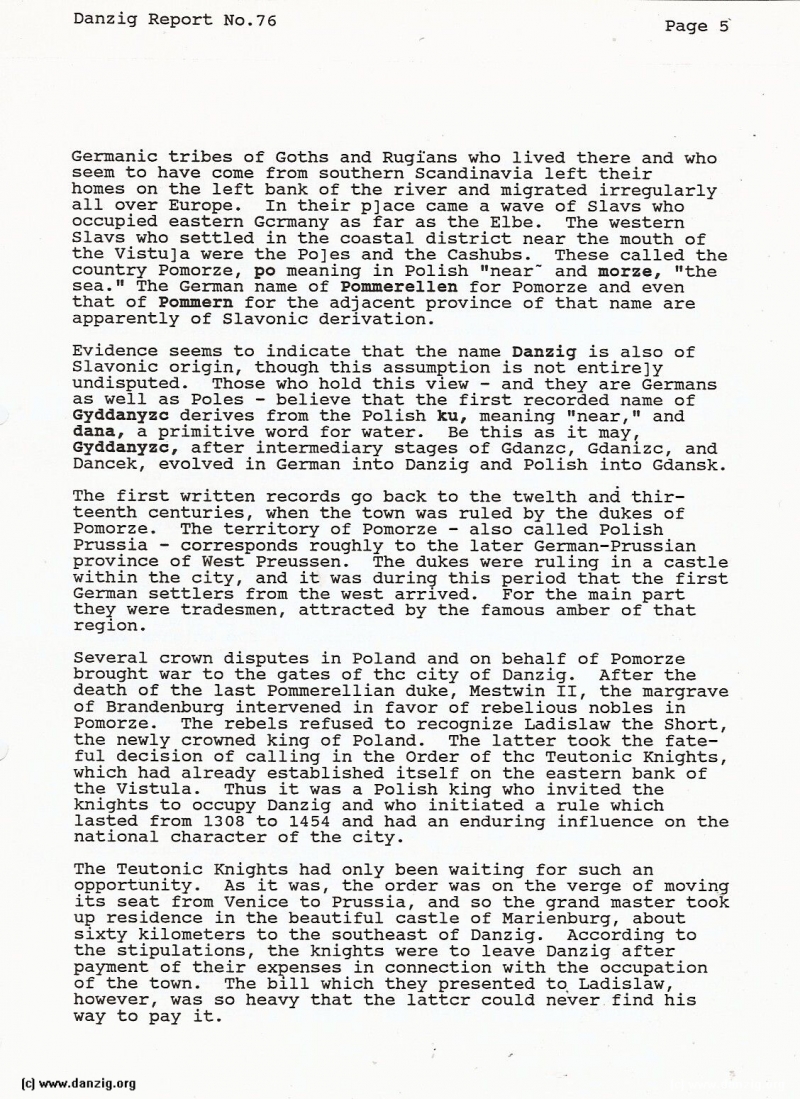
Germanic tribes of Goths and Rugians who lived there and who seem to have come from southern Scandinavia left their homes on the left bank of the river and migrated irregularly all over Europe. In their p]ace came a wave of Slays who occupied eastern Gcrmany as far as the Elbe. The western Slays who settled in the coastal district near the mouth of the Vistuja were the Pojes and the Cashubs. These called the country Pomorze, P0 meaning in Polish “near and morze, “the sea.” The German name of Ponimerellen for Pomorze and even that of Pommern for the adjacent province of that name are apparently of Slavonic derivation.
Evidence seems to indicate that the name Danzig is also of Slavonic origin, though this assumption is not entirejy undisputed. Those who hold this view - and they are Germans as well as Poles — believe that the first recorded name of Gyddanyzc derives from the Polish ku, meaning “near,” and dana, a primitive word for water. Be this as it may, Gyddanyzc, after intermediary stages of Gdanzc, Gdanizc, and Dancek, evolved in German into Danzig and Polish into Gdansk.
The first written records go back to the tweith and thirt eenth centuries, when the town was ruled by the dukes of Poxnorze. The territory of Pomorze — also called Polish Prussia — corresponds roughly to the later German—Prussian province of West Preussen. The dukes were ruling in a castle within the city, and it was during this period that the first German settlers from the west arrived. For the main part they were tradesmen, attracted by the famous amber of that region.
Several crown disputes in Poland and on behalf of Pomorze brought war to the gates of thc city of Danzig. After the death of the last Pommerellian duke, Mestwin II, the margrave of Brandenburg intervened in favor of rebelious nobles in Pomorze. The rebels refused to recognize Ladislaw the Short, the newly crowned king of Poland. The latter took the fatef ul decision of calling in the Order of thc Teutonic Knights, which had already established itself on the eastern bank of the Vistula. Thus it was a Polish king who invited the knights to occupy Danzig and who initiated a rule which lasted from 1308 to 1454 and had an enduring influence on the national character of the city.
The Teutonic Knights had only been waiting for such an opportunity. As it was, the order was on the verge of moving its seat from Venice to Prussia, and so the grand master took up residence in the beautiful castle of Marienburg, about sixty kilometers to the southeast of Danzig. According to the stipulations, the knights were to leave Danzig after payment of their expenses in connection with the occupation of the town. The bill which they presented to Ladislaw, however, was so heavy that the lattcr could never find his way to pay it.
Danzig Report Vol. 1 - Nr. 76 - July - August - September - 1992, Page 5.
Hits: 3425
Added: 02/07/2015
Copyright: 2025 Danzig.org

